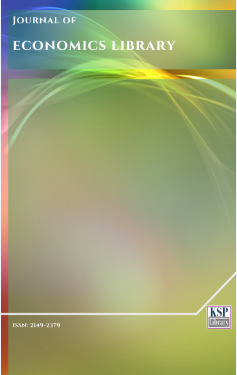Turkey - Africa trade: A gravity model estimation of determinants
Abstract
Abstract. This study investigates the key determinants of trade between Africa and Turkey by using the gravity model of international trade. The major objective is to identify the core socio-cultural and macroeconomic factors of bilateral trade between both sides. Poisson – Pseudo-Maximum Likelihood Estimator is used in order to efficiently test the impact of many dummy variables and fixed effects. The results illustrate that there are geographic, socio-cultural and macroeconomic factors in the African economies and Turkey’s side. African countries near to Turkey, sharing similar religion and recorded higher economic growth rates in the last couple of decades have better bilateral trade with Turkey than the others. Besides, economic freedom improvements in these countries have positive relationship with their bilateral trade. On the other hand, improvement in corruption level of Turkey, increasing its ODA donation and opening commercial consulates in African countries are the positive factors of its bilateral trade with Africa. However, there is no statistical evidence to say Turkey’s trade with Africa is for the purpose of natural resources.
Keywords. Turkey, Africa, Foreign Trade, Gravity Model.
JEL. F01, F14, F19.References
Abidin, I., Abu Bakar, N., & Sahlan, R. (2013). The determinants of exports between Malaysia and the OIC member countries: A gravity model approach. Procedia Economics and Finance. 5, 12-19. doi. 10.1016/S2212-5671(13)00004-X
Bergeijk, P., & Brakman, S. (2010). The Gravity Model of International Trade: Advances and Applications. Cambridge University Press, UK.
Enwere, C., & Yilmaz, M. (2014). Turkey’s strategic economic relations with Africa: Trends and challenges. Journal of Economics and Political Economy. 1(2), 216-230. doi. 10.1453/jepe.v1i2.66
Fung, K.C., & Alicia, G-H. (2012). Foreign direct investment outflows from China and India. China Economic Policy Review. 1(1), 1250003-1250018. doi. 10.1142/S1793969012500033
İpek, V., & Biltekin, G. (2013). Turkey’s foreign policy implementation in Sub-Saharan Africa: A post international approach. New Perspectives on Turkey. 49(1), 121-156. doi. 10.1017/S0896634600002065
Krugman, P., & Obstfeld, M. (2009). International Economics: Theory and Policy. 8th Edition, Prentice Hall, Boston.
Narayan, S., & Nguyen, T. (2016). Does the trade gravity model depend on trading partners? Some evidence from Vietnam and her 54 trading partners. International Review of Economics and Finance. 41, 220-237. doi. 10.1016/j.iref.2015.08.010
Ngouhouo, I. (2013). Multidimensional determinants of foreign direct investment in Central Africa: A modified gravity GMM panel approach. Mediterranean Journal of Social Sciences. 4(1), 575-585. doi. 10.5901/mjss.2013.v4n1p575
Ozkan M. (2010). What drives Turkey's involvement in Africa? Review of African Political Economy. 37(126), 533-540. doi. 10.1080/03056244.2010.530952
Republic of Turkey, Ministry of Foreign Affairs (2017). Turkey - Africa Relations. [Retrieved from].
Shepherd, B. (2012). The Gravity Model of International Trade: A User Guide. United Nations publication, New York.
Turkish Cooperation and Coordination Association (TIKA) (2015). Turkish Development Assistance Report. Ankara, Turkey.
Yu, M. (2010). Trade, Democracy, and the Gravity Equation. Journal of Development Economics. 91(2), 289-300. doi. 10.1016/j.jdeveco.2009.07.004
DOI: http://dx.doi.org/10.1453/jel.v4i4.1535
Refbacks
- There are currently no refbacks.
.......................................................................................................................................................................................................................................................................................................................................
Journal of Economics Library - J. Econ. Lib. - JEL - www.kspjournals.org
ISSN: 2149-2379
Editor: jel@ksplibrary.org Secretarial: secretarial@ksplibrary.org Istanbul - Turkey.
Copyright © KSP Library

